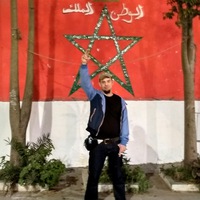Берберский вопрос в Марокко. Попробую максимально кратко.
Несмотря на то, что Марокко является как бы арабской страной, значительная часть ее населения составляют амазиги (в переводе "свободные люди") различных видов. Мы называем амазигов - берберами.
Посчитать сколько точно берберов проживает на территории королевства невозможно. Считается, что около 70% от общего числа марокканцев. Правда, из них лишь половина считает один из берберских языков - своим основным. Остальные товарищи , это так называемые арабиизированные берберы. Есть и потомки смешанных браков. Они чаще считают себя арабами. Например, король Марокко.
Начиная с 1970-ых годов, по всей Северной Африке стал зарождаться берберский национализм. Но как и курдам, берберам мешало отсутствие сплочённости и чёткого понимания кто бербер, а кто нет.
Этого понимания нет до сих пор. И не только в Марокко.
К примеру, почти вся современная берберская культура - письменность, символика и т.д. взята у туарегов, многие из которых не считают себя берберами. Да и вчера в горах, местные марокканские амазиги, в разговоре, берберов упоминали отдельно, а туарегов отдельно. В Ливии ,кстати, при Мухоморе туарегов любили, а обычных берберов притесняли.
Вернёмся к современному Марокко. Плюс 1000 к мудрости короля Мухаммада Шестого. Будучи сам наполовину бербером, король сделал берберский язык (на основе одного из языков/диалектов) и письменность национальными. Надписи часто дублируются даже там, где берберов нет. Есть центры по изучению берберского наследия, на берберском имеется радио и телевещание. Открыт берберский университет. Интересно, что Король не только разрешил берберскую символику,(например, агадесский крест) но и внедрил эту тему в туризм. Появились футболки , шарфы и т.д.
На машинах в горах и в Сахаре, замечены надписи на французском - "Я горжусь тем, что я амазиг".
В самом центре Марракеша, в саду Мажореля открыли отличный музей берберской культуры. На первом же стенде написано - "Берберы - древнее, коренное население Северной Африки".
Сказать, что берберский вопрос в Марокко больше не стоит, разумеется нельзя. Время от времени бывают какие-то демонстрации, всё такое. Но реальной проблемой для страны, после всех нововведений короля, он не является.
Почему? Потому что в музее, в центре Марракеша написано: "Берберы - древнее, коренное население Северной Африки". Точка.
Несмотря на то, что Марокко является как бы арабской страной, значительная часть ее населения составляют амазиги (в переводе "свободные люди") различных видов. Мы называем амазигов - берберами.
Посчитать сколько точно берберов проживает на территории королевства невозможно. Считается, что около 70% от общего числа марокканцев. Правда, из них лишь половина считает один из берберских языков - своим основным. Остальные товарищи , это так называемые арабиизированные берберы. Есть и потомки смешанных браков. Они чаще считают себя арабами. Например, король Марокко.
Начиная с 1970-ых годов, по всей Северной Африке стал зарождаться берберский национализм. Но как и курдам, берберам мешало отсутствие сплочённости и чёткого понимания кто бербер, а кто нет.
Этого понимания нет до сих пор. И не только в Марокко.
К примеру, почти вся современная берберская культура - письменность, символика и т.д. взята у туарегов, многие из которых не считают себя берберами. Да и вчера в горах, местные марокканские амазиги, в разговоре, берберов упоминали отдельно, а туарегов отдельно. В Ливии ,кстати, при Мухоморе туарегов любили, а обычных берберов притесняли.
Вернёмся к современному Марокко. Плюс 1000 к мудрости короля Мухаммада Шестого. Будучи сам наполовину бербером, король сделал берберский язык (на основе одного из языков/диалектов) и письменность национальными. Надписи часто дублируются даже там, где берберов нет. Есть центры по изучению берберского наследия, на берберском имеется радио и телевещание. Открыт берберский университет. Интересно, что Король не только разрешил берберскую символику,(например, агадесский крест) но и внедрил эту тему в туризм. Появились футболки , шарфы и т.д.
На машинах в горах и в Сахаре, замечены надписи на французском - "Я горжусь тем, что я амазиг".
В самом центре Марракеша, в саду Мажореля открыли отличный музей берберской культуры. На первом же стенде написано - "Берберы - древнее, коренное население Северной Африки".
Сказать, что берберский вопрос в Марокко больше не стоит, разумеется нельзя. Время от времени бывают какие-то демонстрации, всё такое. Но реальной проблемой для страны, после всех нововведений короля, он не является.
Почему? Потому что в музее, в центре Марракеша написано: "Берберы - древнее, коренное население Северной Африки". Точка.
Berber question in Morocco. I'll try as briefly as possible.
Despite the fact that Morocco is like an Arab country, a significant part of its population are Amazighs (translated as “free people”) of various kinds. We call Amazighs - Berbers.
It’s impossible to calculate exactly how many Berbers live in the kingdom. It is estimated that about 70% of the total number of Moroccans. True, only half of them consider one of the Berber languages their main language. The rest of the comrades, this is the so-called arabiized Berbers. There are descendants of mixed marriages. They more often consider themselves Arabs. For example, the king of Morocco.
Beginning in the 1970s, Berber nationalism began to emerge throughout North Africa. But like the Kurds, the Berbers were hampered by the lack of cohesion and a clear understanding of who is a Berber and who is not.
This understanding is not yet. And not only in Morocco.
For example, almost all modern Berber culture - writing, symbolism, etc. taken from the Tuareg, many of whom do not consider themselves Berbers. Yesterday, in the mountains, the local Moroccan Amazighs, in conversation, mentioned the Berbers separately, and the Tuareg separately. In Libya, by the way, under Amanita, the Tuareg were loved, and the usual Berbers were oppressed.
Let's go back to modern Morocco. Plus 1000 to the wisdom of King Muhammad the Sixth. Being himself half-Berber, the king made the Berber language (based on one of the languages / dialects) and written language national. Inscriptions are often duplicated even where there are no Berbers. There are centers for the study of the Berber heritage, there is a radio and television broadcasting in Berber. Opened Berber University. Interestingly, the King not only allowed the Berber symbolism (for example, the Agadesa cross) but also introduced this topic to tourism. T-shirts, scarves, etc. appeared.
On cars in the mountains and in the Sahara, there are inscriptions in French - "I am proud that I am Amazigh."
In the very center of Marrakesh, in the garden of Majorelle, an excellent museum of Berber culture was opened. On the very first stand it is written - "Berbers - the ancient, indigenous population of North Africa."
To say that the Berber question in Morocco is no longer worth it, of course it is impossible. From time to time there are some demonstrations, everything. But the real problem for the country, after all the innovations of the king, it is not.
Why? Because in the museum, in the center of Marrakesh it is written: "Berbers are the ancient, indigenous people of North Africa." Point.
Despite the fact that Morocco is like an Arab country, a significant part of its population are Amazighs (translated as “free people”) of various kinds. We call Amazighs - Berbers.
It’s impossible to calculate exactly how many Berbers live in the kingdom. It is estimated that about 70% of the total number of Moroccans. True, only half of them consider one of the Berber languages their main language. The rest of the comrades, this is the so-called arabiized Berbers. There are descendants of mixed marriages. They more often consider themselves Arabs. For example, the king of Morocco.
Beginning in the 1970s, Berber nationalism began to emerge throughout North Africa. But like the Kurds, the Berbers were hampered by the lack of cohesion and a clear understanding of who is a Berber and who is not.
This understanding is not yet. And not only in Morocco.
For example, almost all modern Berber culture - writing, symbolism, etc. taken from the Tuareg, many of whom do not consider themselves Berbers. Yesterday, in the mountains, the local Moroccan Amazighs, in conversation, mentioned the Berbers separately, and the Tuareg separately. In Libya, by the way, under Amanita, the Tuareg were loved, and the usual Berbers were oppressed.
Let's go back to modern Morocco. Plus 1000 to the wisdom of King Muhammad the Sixth. Being himself half-Berber, the king made the Berber language (based on one of the languages / dialects) and written language national. Inscriptions are often duplicated even where there are no Berbers. There are centers for the study of the Berber heritage, there is a radio and television broadcasting in Berber. Opened Berber University. Interestingly, the King not only allowed the Berber symbolism (for example, the Agadesa cross) but also introduced this topic to tourism. T-shirts, scarves, etc. appeared.
On cars in the mountains and in the Sahara, there are inscriptions in French - "I am proud that I am Amazigh."
In the very center of Marrakesh, in the garden of Majorelle, an excellent museum of Berber culture was opened. On the very first stand it is written - "Berbers - the ancient, indigenous population of North Africa."
To say that the Berber question in Morocco is no longer worth it, of course it is impossible. From time to time there are some demonstrations, everything. But the real problem for the country, after all the innovations of the king, it is not.
Why? Because in the museum, in the center of Marrakesh it is written: "Berbers are the ancient, indigenous people of North Africa." Point.



У записи 21 лайков,
1 репостов,
599 просмотров.
1 репостов,
599 просмотров.
Эту запись оставил(а) на своей стене Леонид Ланда









































